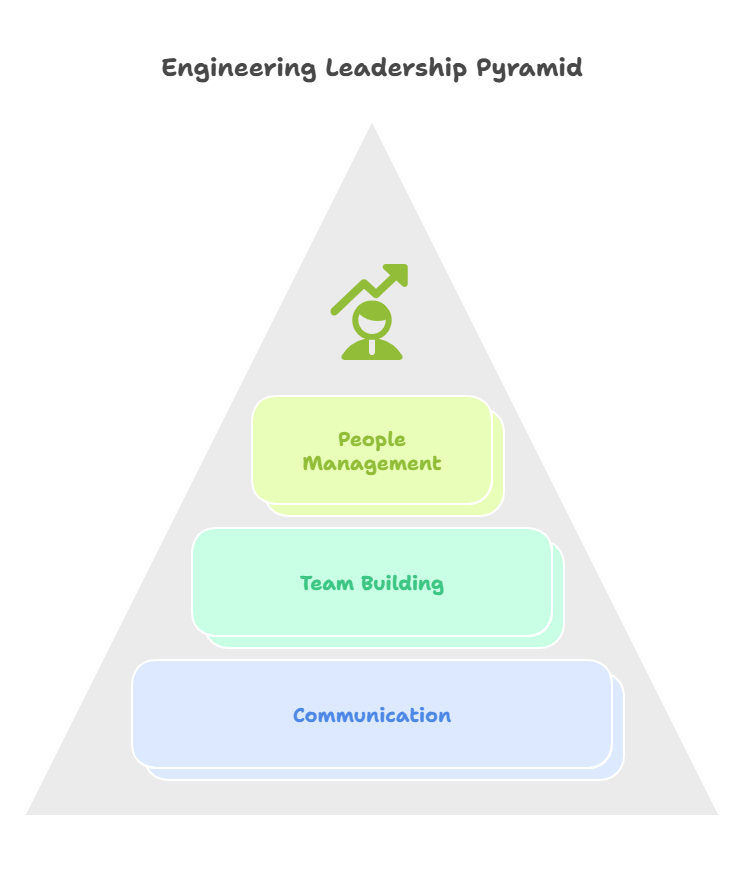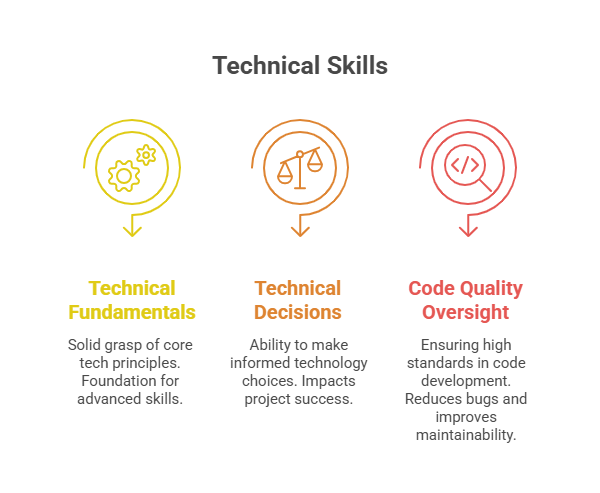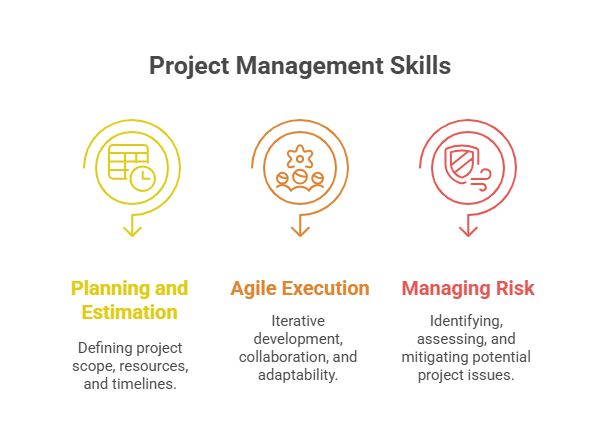Engineering managers play a key role in building reliable software and strong teams. They’re responsible for delivering projects, supporting engineers, and making decisions that move the business forward.
But the shift from writing code to managing people isn’t easy. Suddenly, your job isn’t just about solving problems—it’s about helping others solve them too.
This article breaks down the essential skills every engineering manager needs. From leading day-to-day execution to thinking strategically, we’ll cover what actually matters—and how to grow into the role.
Whether you’re new to management or preparing for it, this guide will give you a clear view of what the job requires and how to succeed in it.
Let’s get started.
#Core Leadership Skills That Define Strong Engineering Managers
Leadership in engineering isn’t about job titles or authority—it’s about how you guide people, shape culture, and support execution. These core skills help managers build trust, keep teams productive, and handle real problems with clarity.

- People Management and Team Growth
A great manager doesn’t just assign tasks—they help people grow. This means understanding each team member’s strengths, giving regular feedback, and having honest career conversations. You should know who’s ready for more, who’s stuck, and how to help them move forward.
Good managers coach, not control. They ask questions, listen closely, and guide—not dictate—decisions. It’s about making your team better without taking over their work.
- Clear and Direct Communication
Teams perform better when they know what’s expected. Managers need to explain goals clearly, share context early, and give feedback that’s honest and helpful. You should also know how to adjust your style when talking to engineers, executives, or cross-functional partners.
More listening, less talking. The best managers create space for others to speak up, raise concerns, and share ideas. That’s how trust builds.
- Hiring and Building Strong Teams
Hiring is a long-term investment. It starts with knowing what the team actually needs—not just tech skills, but also work habits, values, and collaboration styles. A thoughtful process helps avoid bad fits and supports diversity from the start.
Once they’re hired, onboarding matters. New engineers should quickly understand how things work, who to talk to, and what good work looks like.
#Must-Have Technical Skills (Even If You’re Not Coding Every Day)
Engineering managers might not write code full-time, but they still need strong technical judgment. These skills help you earn your team’s respect, make better decisions, and keep projects moving without getting stuck in the details.

- Strong Technical Fundamentals
You don’t need to know every line of code, but you should understand how your systems work. This means being able to discuss architecture, evaluate trade-offs, and spot risky shortcuts. You should be able to follow technical conversations, ask sharp questions, and know when something doesn’t add up.
- Technical Decision-Making
Managers often approve or guide technical decisions. To do that well, you need to balance speed, quality, and long-term impact. Some features need to ship fast. Others need to be built to last. Knowing the difference is key. You also need to understand the cost of tech debt and how to manage it without slowing down the team.
- Code Quality and Review Oversight
You don’t have to review every pull request, but you should set the bar for quality. That includes clear code, solid tests, and maintainable design. You’re also responsible for creating a team culture where reviews are helpful, not blocking. Great managers help engineers improve each other’s work without turning reviews into bottlenecks.
#Project and Delivery Management Skills
Engineering managers are responsible for turning ideas into shipped features. That means planning clearly, running teams effectively, and keeping things on track without micromanaging. These skills help ensure the team moves steadily, avoids surprises, and delivers real value.

- Planning and Estimation
Your job starts before the work begins. Break product ideas into smaller tasks, define what “done” looks like, and involve engineers in estimating the effort. Plans should be realistic, not optimistic. Add buffers where needed and make sure priorities are clear from day one.
- Agile Execution and Daily Operations
Once the work starts, keep momentum without getting in the way. Lead short, focused stand-ups. Track progress during sprints. Help your team stay aligned with goals without checking in on every line of code. Be available to clear blockers quickly so engineers can stay in flow.
- Managing Risk and Trade-Offs
Projects rarely go exactly as planned. Part of your role is spotting risks early—slipping timelines, over-scoped features, or unclear ownership. Know when to cut scope, shift deadlines, or raise concerns with stakeholders. Communicate trade-offs clearly so no one’s caught off guard.
#Strategic and Business-Oriented Thinking
Engineering managers don’t just manage tasks—they help teams build the right things at the right time. To do that, you need to understand how your work fits into the bigger picture. These skills help you align engineering with real business goals and customer needs.
- Aligning Engineering With Business Goals
You can’t lead effectively if you don’t know what the business is trying to achieve. Understand the product roadmap, user needs, and revenue goals. Make sure your team knows why they’re building something—not just what or how. This clarity helps guide better decisions and keeps work focused on what matters.
- Making Smart Technical Decisions With Business Impact
Every technical choice has trade-offs. Some improve speed, others save costs, and some improve long-term stability. Your role is to connect these decisions to business impact. Help your team think beyond the code—how will this change affect users, customers, and the company?
- Metrics and Outcome Ownership
Use data to guide decisions, not to micromanage. Focus on metrics that reflect real value—delivery speed, system health, feature impact—not vanity numbers. Set clear goals with your team, track progress regularly, and adjust based on what the data shows. The goal is steady improvement, not chasing perfect numbers.
What Are the Key Skills Needed for Engineering Managers to Effectively Lead Technical Teams?
Effective engineering managers require a blend of technical knowledge and leadership abilities. Among the essential skills for engineering leaders, communication stands out, enabling them to convey complex ideas clearly. Additionally, problem-solving, adaptability, and emotional intelligence are crucial for guiding teams through challenges and fostering a collaborative environment.
#Soft Skills That Set Great Managers Apart
Technical skills get you into management, but soft skills help you lead. These traits shape how people respond to you, how decisions get made, and how your team handles pressure. Strong soft skills often separate good managers from great ones.
- Decision-Making Under Uncertainty
You won’t always have full clarity—but the team still needs a decision. Great managers stay calm, weigh the options, ask for input, and make a call. Then they take responsibility for the outcome. You can’t delay every decision waiting for perfect data. Know when to move forward and when to dig deeper.
- Time and Energy Management
Your calendar fills up fast. Learn to protect time for thinking, one-on-ones, and supporting your team. Don’t say yes to every meeting or task. Balance deep work with responsiveness, and make sure your team sees you as present, not scattered.
- Adaptability and a Learning Mindset
Things change—team structures, company goals, tech stacks. Stay flexible. Be open to feedback, learn from mistakes, and show your team that growth matters more than perfection. Managers who keep learning set the tone for teams that keep improving.
How to Build and Improve These Skills Over Time
You don’t need to master every skill on day one. What matters is steady progress and self-awareness. Great engineering managers learn on the job—and keep learning.
- Start With Self-Assessment
Begin by being honest about what you’re good at and where you struggle. Ask for feedback from your team, peers, and manager. Look at how your team performs—often, it reflects your strengths and gaps as a leader.
- Learn From Others
Find mentors who’ve done the job well. Join communities where managers share real problems and lessons. Talk to product managers, designers, and senior engineers to see how they think. You’ll grow faster by learning from different viewpoints.
- Use Resources That Work
Not every book or course will help, so pick the ones that fit your stage. Focus on what you can apply now—whether that’s running better one-on-ones or improving how you plan sprints. Podcasts, blogs, and short-form content can also keep your thinking sharp without taking too much time.
- Practice, Reflect, Repeat
The best way to grow is by trying, reflecting, and adjusting. Set one goal each month—maybe it’s giving better feedback or delegating more. Track how it goes. You don’t need big wins—just steady steps.
Conclusion
Strong engineering managers aren’t defined by how much they know—but by how well they help others do great work. The role isn’t about being perfect in every area—it’s about showing up consistently, making thoughtful decisions, and creating an environment where teams can thrive.
If you’re new to management, focus on progress over perfection. Improve one skill at a time. If you’ve been in the role for a while, keep asking what your team needs to grow—and what’s holding them back. Your job is to remove friction, not add more.
Technical leadership changes fast. The best managers adapt, stay curious, and lead with clarity—even when the path isn’t clear. That’s how teams stay focused, motivated, and ready to build what matters.




